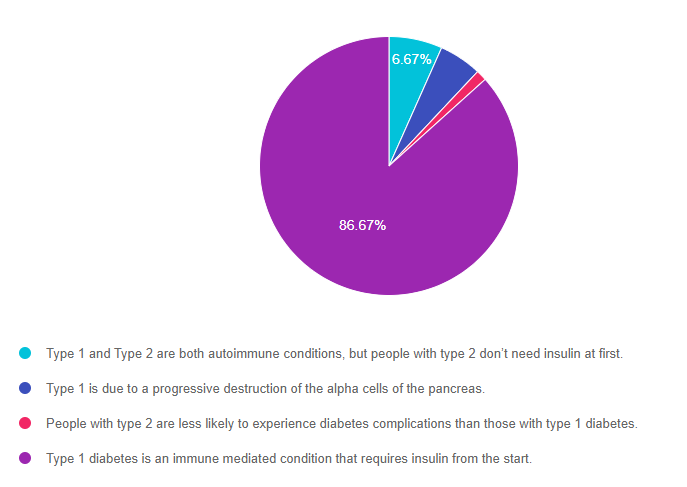
We quizzed test takers on the difference between Type 1 & Type 2 Diabetes. 87% of respondents chose the best answer. We want to share this important info so you can pass it on to people living with diabetes and your colleagues, plus prepare for exam success!
Before we start though, if you don’t want any spoilers and haven’t tried the question yet, you can answer below: Answer Question
Question: JS has newly diagnosed type 1, yet their parent has type 2 diabetes. They ask you the difference between the two types of diabetes.
What is your best response?
Answer Choices:
- Type 1 and Type 2 are both autoimmune conditions, but people with type 2 don’t need insulin at first.
- Type 1 is due to a progressive destruction of the alpha cells of the pancreas.
- People with type 2 are less likely to experience diabetes complications than those with type 1 diabetes.
- Type 1 diabetes is an immune mediated condition that requires insulin from the start.

As shown above, the most common choice was option 4, the second most common answer was option 1, then option 2, and then finally option 3.
Getting to the Best Answer
Answer 1 is incorrect. 6.67% chose this answer, “Type 1 and Type 2 are both autoimmune conditions, but people with type 2 don’t need insulin at first.” Only type 1 diabetes is considered an immune mediated condition where there is autoimmune destruction of the beta cells. About 30% of people with type 2 will eventually require insulin due to gradual loss of beta cells.
Answer 2 is incorrect. 5.33% of you chose this answer, “Type 1 is due to a progressive destruction of the alpha cells of the pancreas.” In type 1 diabetes, there is destruction of the beta cells that produce insulin, not the alpha cells. Alpha cells produce glucagon, an important hormone that increases glucose levels.
Answer 3 is incorrect. 1.33% of respondents chose this answer, “People with type 2 are less likely to experience diabetes complications than those with type 1 diabetes.” Complications are a result of a complex interplay of genetics, lifestyle and duration plus severity of hyperglycemia. Many people with type 2 diabetes already have complications at diagnosis due to unknowingly having diabetes for an average of six years.
Finally, Answer 4 is correct. 86.67% chose this answer, “Type 1 diabetes is an immune mediated condition that requires insulin from the start.” YES, This is best answer. All people diagnosed with type 1 diabetes immediately need exogenous insulin since their beta cells have been destroyed and they are at risk for hyperglycemic crisis due to insulinopenia.
We hope you appreciate this week’s rationale! Thank you so much for taking the time to answer our Question of the Week and participate in this important learning activity!
Want to learn more about this topic?
Enroll in our Diabetes Fundamentals | Level 1
Airs Live Jan 11th – Jan 27th, 2022 at 11:30 am PST
This bundle is specifically designed for healthcare professionals who want to learn more about diabetes fundamentals for their clinical practice or for those who are studying for the Certified Diabetes Care and Education Specialist (CDCES) exam.
2022 Live Webinar Updates
- January 11, 2022 – Class 1 – Getting to the Nitty Gritty 1.5 CEs
- January 13, 2022 – Class 2 – Nutrition and Exercise 1.5 CEs
- January 18, 2022 – Class 3 – Insulin Therapy & Pattern Management 1.5 CEs
- January 20, 2022 – Class 4 – Meds Overview for Type 2 – 1.5 CEs
- January 25, 2022 – Class 5 – Goals of Care – 1.5 CEs
- January 27, 2022 – Class 6 – Hypoglycemia, Sick Days, Monitoring, Foot Care 1.5 CEs
Intended Audience: A great course for healthcare professionals in the field of diabetes education looking for a straightforward explanation of identification and treatment of hyperglycemic crises.
Instructor: Beverly Thomassian RN, MPH, CDCES, BC-ADM is a working educator and a nationally recognized diabetes expert.
All hours earned count toward your CDCES Accreditation Information
Sign up for Diabetes Blog Bytes – we post one daily Blog Byte from Monday to Friday. And of course, Tuesday is our Question of the Week. It’s Informative and FREE! Sign up below!
[yikes-mailchimp form=”1″]The use of DES products does not guarantee the successful passage of the CDCES exam. CBDCE does not endorse any preparatory or review materials for the CDCES exam, except for those published by CBDCE.









